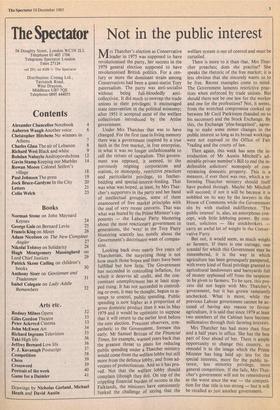Not in the public interest
Mrs Thatcher's election as Conservative leader in 1975 was supposed to have revolutionised the party, her success in the
1979 general election supposed to have revolutionised British politics. For a cen- tury or more the dominant strain among Conservatives had been a quasi-statist Tory paternalism. The party was anti-socialist without being full-bloodedly anti- collectivist. It did much to enwrap the trade unions in their privileges; it encouraged state intervention in the political economy; after 1951 it accepted most of the welfare collectivism introduced by the Attlee government.
Under Mrs Thatcher that was to have changed. For the first time in living memory there was a government inspired by a true faith in the free market, in free enterprise, in what it was no longer unfashionable to call the virtues of capitalism. This govern- ment was opposed, it seemed, to the previously reigning corporatism and statism, to monopoly, restrictive practices and particularist privilege, to feather- bedding and special-interest-feeding. That was what was hoped, at least, by Mrs That- cher's supporters in the party and her band of intellectual groupies, some of them enamoured of free market principles with the zeal of very recent converts. That was what was feared by the Prime Minister's op- ponents — the Labour Party blustering about the most reactionary government in generations, the 'wets' in the Tory Party blustering scarcely less noisily about the Government's doctrinaire want of compas- sion.
Looking back over nearly five years of Thatcherism, the surprising thing is not how much those hopes and fears have been fulfilled but how little. The Government has succeeded in controlling inflation, for which it deserves all credit, and the con- comitant unemployment has at least stop- ped rising. It has not succeeded in controll- ing or even, it may be thought, begun to at- tempt to control, public spending. Public spending is now higher as a proportion of gross domestic product than it was in May 1979 and it would be optimistic to suppose that it will return to the earlier level before the next election. Prescient observers, sym- pathetic to the Government, foresaw this early. Mr Samuel Brittan of the Financial Times, for example, warned years back that the greatest threat to plans for reducing public spending under a Thatcher ministry would come from the welfare lobby but still more from the defence lobby, and from ad- vocates of protectionism. And so it has pro- ved. Not that the welfare lobby should , complain (though they do). On top of the crippling financial burden of success in the Falklands, the ministers have consistently funked the challenge of saying that the welfare system is out of control and must be curtailed.
There is more to it than that. Mrs That- cher preaches; does she practise? She speaks the rhetoric of the free market; it is less obvious that she sincerely wants us to be free. Recent examples come to mind. The Government laments restrictive prac- tices when enforced by trade unions. But should there not be one law for the worker and one for the professions? Not, it seems, from the wretched compromise cooked up between Mr Cecil Parkinson (handed on to his successor) and the Stock Exchange. By this, the Exchange 'plea-bargained', agree- ing to make some minor changes in the public interest so long as its broad workings were not exposed to the Office of Fair Trading and the courts of law.
Then again, this week has seen the in- troduction of Mr Austin Mitchell's ad- mirable private member's Bill to end the in- defensible solicitors' monopoly of con- veyancing domestic property. This is a measure, if ever there was one, which a re- forming Thatcher ministry should itself have pushed through. Maybe Mr Mitchell will succeed; if not it will be because it is nobbled on its way by the lawyers in the House of Commons while the Government sits by with studied indifference. 'The public interest' is, alas, an amorphous con- cept, with little lobbying power. By con- trast, solicitors — like stockbrokers — carry an awful lot of weight in the Conser- vative Party.
But not, it would seem, as much weight as farmers. If there is one outrage, one scandal for which this Government may be remembered, it is the way in which agriculture has been grotesquely pampered, with every kind of fiscal privilege granted to agricultural landowners and barnyards full of money syphoned off from the taxpayer to be given to farmers. To be sure, this pro- cess did not begin with Mrs Thatcher's government, but it has grown rampantly unchecked. What is more, while the previous Labour government cannot be ac- cused of having any reason to favour agriculture, it is said that since 1979 at least two members of the Cabinet have become millionaires through their farming interests.
Mrs Thatcher has had more than four and a half years in office. She has the best part of four ahead of her. There is ample opportunity to change this country, to remodel it in the image which the Prime Minister has long held up; less for the special interests, more for the public in- terest, less minority privilege, more general competition. If she fails, Mrs That- cher's government will not be remembered as the worst since the war — the competi- tion for that title is too strong — but it will be recalled as just another government.














































 Previous page
Previous page